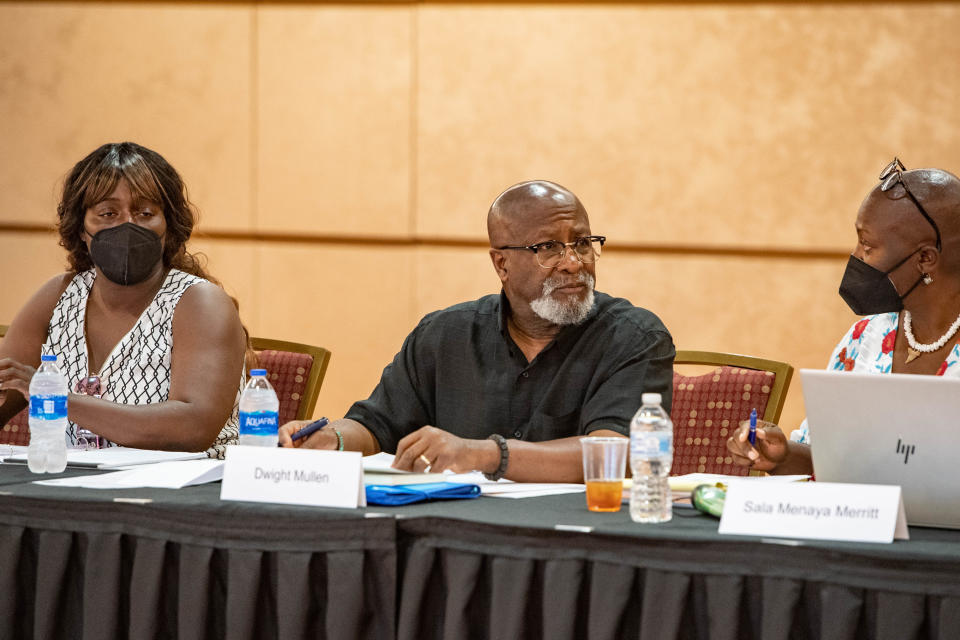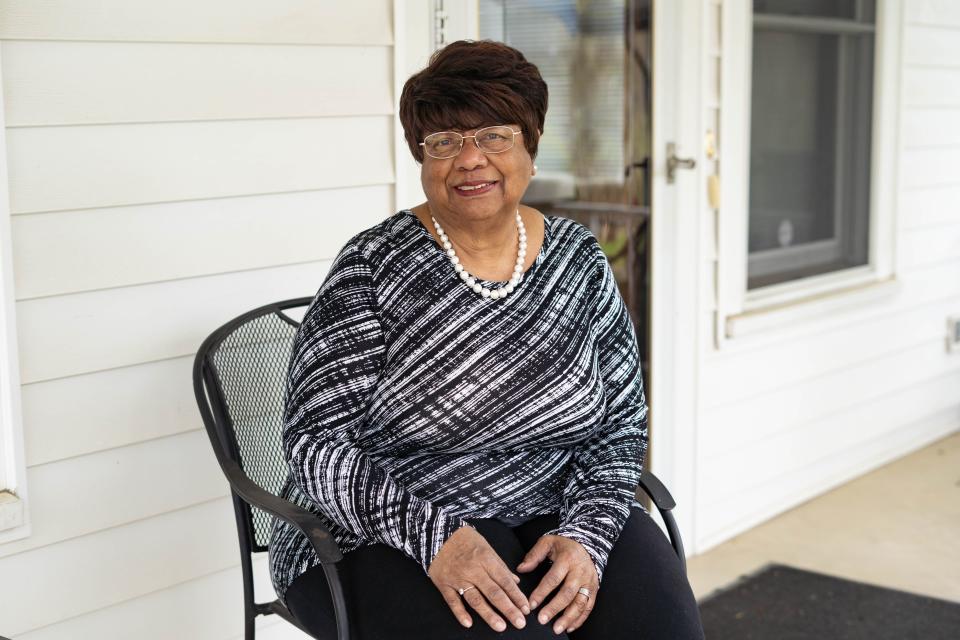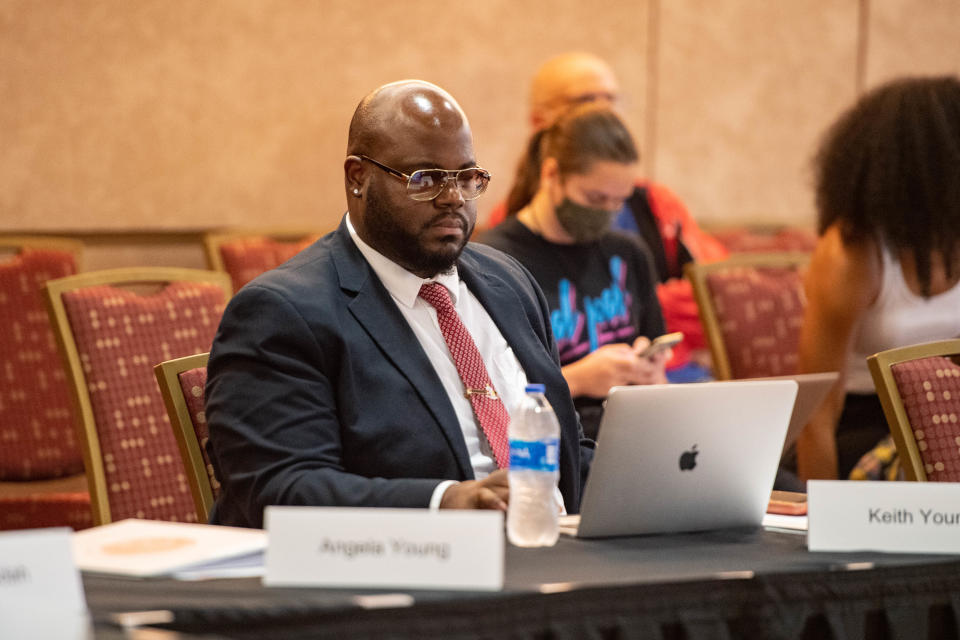What is reparations? 17 months in, Asheville board is still struggling to define itself.
ASHEVILLE - Since the beginning, Asheville and Buncombe County's reparations process has been navigating largely uncharted territory. Frustration was palpable at a recent meeting as commission members again found themselves debating the board's central question: What is reparations in Asheville?
Now, 17 months into the process, the 25-member Community Reparations Commission is still entrenched in discussions about this definition, which dominated a Sept. 18 meeting, as some members argued that the process is not truly reparations at all, and others called for better time management, more cohesion and the power to effectively redress damage caused by public and private systemic racism against Asheville's Black residents.
Echoes of the conversation have been ongoing for months, and though the September commission meeting grew somewhat heated, Chair Dwight Mullen told the Citizen Times he was happy discussion went there.
He called the debate "absolutely necessary," even more important that it happened in the public eye.

Mullen is a retired political science and Africana studies professor at UNC Asheville. He founded the State of Black Asheville, a groundbreaking research project that began as an undergraduate research project at UNCA.
It was a historic conversation, he said. Asheville and Buncombe County are among the first locales in the country to undertake such an effort, responsible for creating a blueprint for unprecedented change.
“We’re developing the language. We’re starting to talk to each other," Mullen said. "That’s no small thing."
More: What does reparations mean? 8 months into process, Asheville still finding its way
Vote on definition?
After repeated delays, the board was first seated in April 2022.
Since then, the commission has seen the departure and replacement of its project manager, staff turnover, an extended timeline and the resignation and reappointment of several commission members.
The commission will be facing another major shift with the Sept. 22 announcement that Brenda Mills is retiring. The city's equity and inclusion director, Mills has been among Asheville reparation's leaders since she began serving as the department's interim director in July 2021. She was officially appointed that November.
Her retirement is effective Jan. 31, 2024, according to the city news release.
"The impacts of her work with the Reparations Commission will leave a lasting legacy," the release said.
The September discussion around defining reparations carried over from the commission's July retreat. The agenda called for a discussion and a vote. The retreat's facilitator was Vernisha Crawford, CEO of the Charlotte-based Trauma Informed Institute. She returned for the September meeting.
A definition would lend itself to create "cohesiveness," said one commission member, Osondu McPeters.
"If you ask everybody around here ‘how do you define reparations?’ ... not saying you're going to get all different answers, but I feel like they’re going to be worlds apart," he said.

Norma Baynes, among the commission's Shiloh neighborhood representatives, said it's important to define the work: "We want to get it right."
Dee Williams argued the city and county process was not actually reparations. Reparations, she said, refers to a national effort, arguing that the local municipalities did not have adequate dollars to provide true reparations.
“This is community reinvestment. This is not real reparations," she said.
It was that point that Keith Young, the former City Council member who wrote the city's historic initiative, and is now a reparations commission member, took issue with.
He pointed to the July 2020 resolution passed by Asheville City Council, which initiated the reparations process for Black Asheville. "When you got to this table, what did you think you were joining up for?" he asked.
“We do have the ability to address all of those things that have happened on a local level. If we have public policies and procedures that have aggrieved Black people in Buncombe County that came through the local government, we can reverse that through the local government," Young said.
“If we have public policies and procedures that have hindered people from economic development, from housing, from health care, from education on a local level, we can remedy that on a local level. We’re not talking about equity.”
More: Asheville Black and women-owned contractors lack access to city projects some say
More: 'As a Black man, I'm appalled': Report shows gap between Black, white student achievement
It is reparations, he said of the process. "You people around this table are the first. We're going to do what we need to do."
At the end of the nearly hourlong discussion, Crawford read a lengthy amalgamation of comments provided by council members. Though it did not leave everyone satisfied, she said it was a "starting point." The commission did not take a vote on the item.

Are direct payments on the table?
As it has since the beginning, debate also circled the issue of direct payments. Some members seem convinced it's not an option, while others, like Young, argue the resolution does not explicitly exclude financial compensation, "or anything else."
Mullen, as well, said he envisions a form of direct payments as an outcome of the process.
A presentation included in the meeting documents, amid a list of "Frequently Asked Questions," said that "projects that benefit individual persons or businesses are not eligible."
In a December Citizen Times article detailing a view of the process eight months in, Mills said there was "no way" a local government could write a check for everyone that has been harmed in Asheville.
But in an August interview, she said "there is nothing off the table." If that's the desired recommendation, she said, "we are not limiting them." But after the reparations commission members vote, any recommendations will go to City Council and Buncombe County Board of Commissioners for final approval.
When asked about the possibility of direct payments, City Attorney Brad Branham said it is difficult to provide a legal opinion without a more comprehensive proposal to consider.
"Generally speaking, the North Carolina Constitution places fairly strict prohibitions on local governments providing any direct benefits to an individual or entity without a corresponding public purpose," he said. "This represents a high legal bar which would restrict direct payments, as they are usually envisioned, in the vast majority of cases."
2-year timeline extension proposed
Also on Sept. 18, a project timeline was discussed, including a proposal to extend the Community Reparations Commission for an additional two years. According to a timeline presented by Project Manager Christine Edwards at the retreat, project closeout is scheduled for April.
A vote on the updated project timeline was also tabled.
Since the commission was first seated, they have made two recommendations: the first for funding in perpetuity and the second requesting an official third-party audit of both local governments to ensure harms being done to Black residents are stopped.
Between the county and city, $5.6 million is currently allocated, Mills said.
As proposed at the retreat, from February to April, the intention is for final recommendations to be compiled and presented and shared with the public, and the project manager will lead the development of the reparations action plan.
Mullen said in September that he feels optimistic major proposals are incoming from the several impact focus area workgroups. From there, he said, it falls to the city and county.
Want to learn more?
All meetings of the full Reparations commission can be watched on the city's YouTube page. The Sept. 18 meeting is archived at youtube.com/watch?v=AuzDXkFZ2Y8.
More: Asheville reparations: Group selected to perform city, county audit with $174K contract
More: Finally! 1st Asheville Reparations Commission meeting; neighborhoods to weigh in
Sarah Honosky is the city government reporter for the Asheville Citizen Times, part of the USA TODAY Network. News Tips? Email shonosky@citizentimes.com or message on Twitter at @slhonosky. Please support local, daily journalism with a subscription to the Citizen Times.
This article originally appeared on Asheville Citizen Times: Asheville reparations: Board members debate definition, timeline

